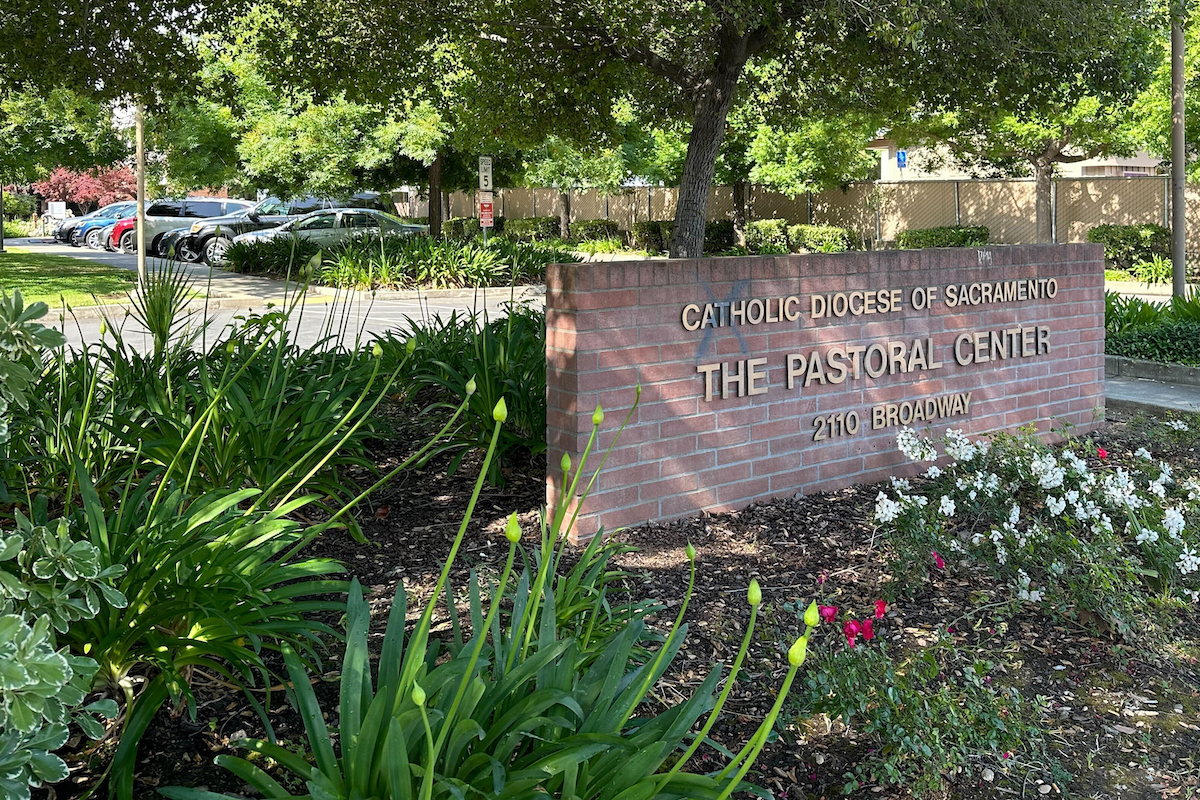

The Roman Catholic Diocese of Sacramento is seen in Sacramento, Calif., Monday, June 5, 2023. Sixteen migrants from Venezuela and Colombia were brought to the diocese’s offices on Friday, June 2, 2023, after being flown from Texas to Sacramento. (AP Photo/Tran Nguyen)
By Iván Espinoza-Madrigal and Eliza Davern
Lawyers for Civil Rights spent this week responding to the State of Florida’s latest flights transporting migrants to Sacramento, California. On the ground, we worked in close partnership with community-based organizations leading the humanitarian relief effort, including Sacramento Area Congregations Together (Sacramento ACT) and PICO California. We shared lessons learned from the Martha’s Vineyard migrant political stunt that unfolded this past fall. We also listened.
The experiences of many migrants affected by the stunt reminded us of the interplay between political persecution, abject poverty, and intense vulnerability—a constellation of intersecting hardships often impacting newcomers in our country.
In Sacramento, many of the affected migrants are Venezuelans. Many have survived unspeakable conditions, including hunger and homelessness. Their extreme poverty cannot be divorced from the collapse of their home country. It’s also tied to political repression and persecution by an authoritarian regime.
Venezuela’s downfall has important lessons for Americans. Contrary to our commonly held views, political stability and economic prosperity are not guaranteed. Democracy is fragile. Backsliding is not off the table. There is absolutely no reason to think that we couldn’t be the next Venezuela.
As we met Venezuelan migrants in Sacramento, Martha’s Vineyard, and El Paso, we are constantly reminded of their country’s reversal of fortune—even as most Americans don’t know or appreciate this history. For much of the 20th century, Venezuela was considered one of the most prosperous and stable countries in the world. Migrants flocked to Venezuela to work in its sophisticated economy, particularly its oil industry. By many accounts, it was not far behind the United States.
Today, most Venezuelans are fleeing with nothing—often on foot. There’s exhaustion from months of trekking through treacherous conditions in some of the most dangerous areas of the world. Many are battling unimaginable trauma, including rape and other forms of violence. Experts estimated that 60 to 80 percent of female migrants from Central America are sexually assaulted on their journey. The insecurity often continues even after they cross the U.S. border because they lack a safety net. We often fail to appreciate the lived experiences of those affected, including LGBTQ+ individuals and women whose struggles are far too often invisibilized.
As one recent migrant shared with Lawyers for Civil Rights, “We were sleeping outdoors in an alley, and we showered in the same place where we urinated and defecated.”
These deplorable conditions were in Texas, but they are not uncommon on both sides of the border. Just look at recent conditions along the Mexican side of the Rio Grande. Migrants don’t always have a viable path forward, and they can easily fall prey to fraudulent schemes. In this context, is it surprising that migrants come to rely on those they perceive to be good Samaritans?
Venezuela’s collapse will continue to trigger waves of migrants—and they will join asylum seekers from Haiti and Central America desperate for immigration protection and relief. We need greater leadership at the federal level to provide concrete solutions and to align immigration with American economic needs, including severe labor shortages across many industries and sectors.
We also need to learn from Venezuela that well-developed political and economic systems are not immune to failure. Democracy needs to be carefully maintained and nurtured. Turning a blind eye on the Martha’s Vineyard or Sacramento political stunts impoverishes our democracy. It contributes to the deterioration of our institutions—legal, political and otherwise.
If you are outraged by the flights to Martha’s Vineyard and Sacramento, you should also care about the migrants who show up at front-line organizations such as Lawyers for Civil Rights, La Colaborativa, Centro Presente, and the Brazilian Worker Center. Helping those migrants is just as important as helping the 49 affected in Martha’s Vineyard and the 36 affected in Sacramento. We can —and should— care about more than 85 people.
As we respond to the next political stunt involving migrants, let’s commit to protecting the institutions and liberties we often take for granted.
Iván Espinoza-Madrigal and Eliza Davern work at Lawyers for Civil Rights, the organization representing the Martha’s Vineyard migrants.



how any latino could witness th collapse of venezuela and cuba and still vote for socilaism disgusts me